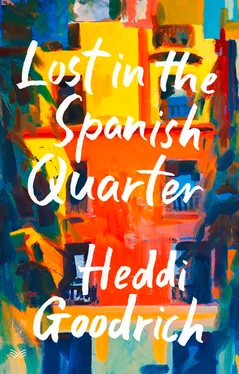I dislike the life I lead. For the past two years I’ve been working on an oil platform in the middle of the Adriatic Sea. I’m a laborer. I work fifteen days a month and then the other fifteen I’m free (so to speak). The work doesn’t give me any form of gratification. I’m afraid of being the same person day in and day out.
I’m still looking for a job abroad, but every time I send off my résumé I spend entire days fantasizing about finding work somewhere not far from you and maybe popping over to your house for a cup of coffee and a chat.
I constantly think of the mistakes I’ve made, which all converge into a sort of large basin of failure. You’re probably wondering what it is I want from you. I don’t know. But you’re the only woman I’ve ever really loved. I hurt you, and even after all these years I’m unable to find an explanation as to why I ran away from you. I can only find excuses with myself. I’m well aware that I threw away my only chance of a peaceful and happy life, with you. It’s an awareness that grows deeper over the years, that I ferociously walked all over the feelings, respect, and love of the most beautiful person I’ve ever met and will ever meet. It’s the certainty that I folded my cards at a time when I could have walked away with the whole pot.
This makes me come back to the question: What do I want from you? I want you to know that my self-esteem is reduced to a few scraps; I want you to know that there will never be another woman like you in my life. I’ve had a few flings, which I’ve come out of feeling more aware, more certain than ever, of the amount of shit I’ve buried myself under. I want you to see what a useless existence I have; I want to be sure I’ve shown you that you were right.
It’s good to know you haven’t completely buried my name, it’s good to hear a bit about you and your cat. It’s a gift I don’t deserve. I hope you’ll want to tell me more. I’d love to be able to imagine you, what you do every day, where you buy your groceries, what you cook, how you spend your weekends. Please write soon. And in the meantime, say hello to those Mexican cowboys for me and, if you think it’s not too inappropriate, to Barbara and your father.
p.
4 Contents Cover Title Page LOST IN THE SPANISH QUARTER Heddi Goodrich Copyright Dedication Chapter 1 Chapter 2 Chapter 3 Chapter 4 Chapter 5 Chapter 6 Chapter 7 Chapter 8 Chapter 9 Chapter 10 Chapter 11 Chapter 12 Chapter 13 Chapter 14 Chapter 15 Chapter 16 Chapter 17 Chapter 18 Chapter 19 Chapter 20 Chapter 21 Chapter 22 Chapter 23 Chapter 24 Chapter 25 Chapter 26 Chapter 27 Chapter 28 Chapter 29 Chapter 30 Chapter 31 Chapter 32 Chapter 33 Acknowledgments A Note from the Translator and Author About the Author About the Publisher
GUESS WHO’S COMING TONIGHT,” said Sonia as we set the table, which had been carried out to the terrace for the occasion. “Angelo invited him,” she whispered. A crescent of a smile lit up her beautiful Mediterranean face as warm blasts of wind made strands of her hair go suddenly weightless like black seaweed in the water.
The scirocco had started to blow a few days earlier, creeping up on us without a sound. The Saharan wind always turned up around that time of year, and yet somehow it continually took us by surprise. Like a tropical mudslide it rolled down the streets of the Spanish Quarter, pressing itself indecently against everything in its path: the thighs of married women, the fur of stray dogs, cabbages sliced in half. Once inside the quarter, it strayed down the side streets, now left and now right, north and south, for it had no real aim there other than to blow the finest desert sand through the lace of panties hung out to dry and the engines of scooters parked for too long, and to blanket every last soul in a twisting, grating warmth.
Still, there was a raw pleasure in the scirocco: in its temporary lawlessness, in the sense of powerlessness and the heat it brought with it. It was finally warm enough to eat outside. The desert wind was a sign that summer was on its way, shepherded slowly up from Africa, and now more than any other year it made me yearn for that long, laid-back season. A desire that, upon hearing Sonia’s words, became a dull ache in my gut. I heard a murmuring in my ear. It was the wind: Hurry up , it was saying .
“I’ve made up my mind. I’m going to talk to him tonight.”
“Great, Sonia. You really should.”
“Oh, the pasta!”
“I’ll go.”
At least in the kitchen there was no one around, not even the wind. I stirred the bucatini, the clumsiest of all pastas, long pasty limbs that went all awry and refused to be tamed, especially tonight, by my big wooden spoon. Before long I heard voices rising up from the front door. Then footsteps on the stairs.
Angelo was squealing, “Wicked, this stuff is the bomb!”
Then a vaguely familiar male voice. “Yeah, my grandparents make it too.”
Finally, a deep, soulful voice. “It’s not as good as last year’s. I hope you like it anyway.”
How had I not been moved, the night of the party, by the power of his voice? Pietro came up the stairs first, holding an unlabeled bottle of wine. I didn’t look at him but at the curly-haired boy behind him, whom I recognized as Davide, followed by Angelo carrying something wrapped in butcher paper.
“Look what Pietro’s brought from the farm,” chirped Angelo, opening the brown paper for me to see. “Homemade soppressata, how about that?”
“Great,” I said, stealing a glance at Pietro as he waited in the living room under the ceiling medallion. He just stood there awkwardly, leaning heavily on one leg as if the other was lame.
I put down the steaming spoon. “It’s this way,” I said under my breath and, whether he’d heard me or not, he followed me outside.
“Jesus Christ,” were his first words. “What is this place, the royal palace?” He was looking at the chipped stucco waterspout attached to the terrace wall. In better times, water would have poured from the mouth of the devilish face into the basin.
Tonino greeted Pietro with a manly pat on the shoulder, taking the wine from him. “Whoever built it was probably just some prick trying to look like King Ferdinand the Fourth. Have you seen the frescoes? Fucking cheesy.”
“In other words, the apartment’s an illegal addition,” said Luca, “built on top of the original building from the 1600s. It probably dates back to no earlier than the 1930s.”
“Well, whenever it was built,” Pietro replied, “the owners must have been rolling in cash.”
“Yeah, maybe years ago when this neighborhood might have been halfway decent,” said Angelo. “But the current owners are just a bunch of vasciaioli . They’re trashy as hell, and they’re crooks too. You should hear what fine Italian they speak when they call to put up the rent.”
“They spend the day in the vascio ,” Luca clarified. “But their private rooms are on the next floor up.”
“Big fat difference …”
“How the fuck do you always know all this shit?” Tonino said.
“I couldn’t help noticing your delightful neighbor,” said Davide, and in fact no one ever missed the transvestite standing outside the ground-floor home across from our building, with legs like a horse’s. It wasn’t easy to walk past without slowing down and at the same time tear your eyes away from the innards of the room, which, with its blood-red couch, faux marble, and fake gold fittings, tried to suck you in like a Chinese brothel.
“Enough to make a straight guy turn gay,” said Tonino, his machismo perfectly intact.
Angelo was shaking his head. “Why anyone would choose to live down there instead of in an awesome place like this is beyond me.”
Читать дальше












